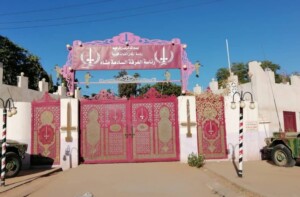Negotiations on outstanding thorny issues for Sudan’s Final Agreement to start soon
The Forces for Freedom and Change-Central Council (FFC-CC) announced that extensive consultations on the outstanding issues of the Final Agreement with the military junta will start soon. Signatories of the signed Framework Agreement will visit Sudan’s states in the hope to convince more parties to sign.
 The signing ceremony of the Framework Agreement in Khartoum on December 5 (RSF)
The signing ceremony of the Framework Agreement in Khartoum on December 5 (RSF)
The Forces for Freedom and Change-Central Council (FFC-CC) announced that extensive consultations on the outstanding issues of the Final Agreement with the military junta will start soon. Signatories of the signed Framework Agreement will visit Sudan’s states in the hope to convince more parties to sign.
The agreement between an alliance of civilian parties, headed by the FFC-CC, and Sudan’s military junta consists of two parts: an initial Framework Agreement, which was signed earlier this month, and a Final Agreement, which covers some outstanding thorny issues that still require further negotiations.
The outcomes of these negotiations are aimed to be included in a Final Agreement by the end of the month.
In a statement on Sunday, the National Umma Party's (NUP) Political Bureau appealed to all parties involved in the current political process to reach a Final Agreement with the military junta on a new civilian government before the end of this month, “to speed up the completion of the second phase of the political process”, pointing to the "urgent need to fill the legislative and executive vacuum and its implications for the lives of the Sudanese”.
'There is an urgent need to fill the legislative and executive vacuum' – NUP
The NUP called on the authorities “to curb the violations of the right to freedom of expression by the security forces”, and “to prevent affiliates of the ousted regime [of dictator Omar Al Bashir], who penetrated the joints of the state, from exploiting [the current situation] and thwart the reaching a solution that satisfies everyone”.
In accordance with proposed timetables, workshops and conferences will start soon “to discuss the issues that need broad participation to reach an agreement, namely justice and transitional justice, the Juba Peace Agreement (JPA), the dismantling* of remnants of the former Al Bashir regime, and reform of the military and security forces,” El Wasig El Bereir, Secretary General of the National Umma Party (NUP) and spokesperson for the FFC-CC, said in a press statement yesterday.
The NUP leader said that immediately after the signing of the Final Agreement, consultations on a new prime minister and head of state will begin “in order to start a new transitional period with a clear vision and clearly specified programme of action to implement the files of the transitional period within two years, and which will lead to fair elections in which the Sudanese people choose who will rule them based on their full free will”.
Framework Agreement
The signatories to the Framework Agreement will visit different states to explain the contents of the agreement, hoping to convince other parties to sign as well. Even though the international community welcomed the agreement, not everyone in Sudan has been equally impressed and many opposition groups reject it.
“The Framework Agreement between the military and civilian forces in the country represents an important stage in establishing a civilian authority and starting a new transitional phase,” El Bereir said.
The NUP, however, warned that the call to expand the base of signatories to the Framework Agreement does not mean “flooding it with names and forces that do not believe in democratic transformation”.
The most contentious issues have been postponed to the Final Agreement negotiations, but even the Framework Agreement is already subject to criticism because of its proposed review of the Juba Peace Agreement (JPA).
Political scientist Azza Mustafa warned of further polarisation between the various political groups because of the agreed-on review of the JPA.
Mustafa told Radio Dabanga’s Sudan Today programme yesterday that the clause in the Framework Agreement on the review of the JPA raises many questions, including whether it is still possible to implement the agreement during the now agreed-on transitional period of 24 months.
“It would be better to develop a comprehensive and thought-out framework on which the political forces agree and include the opinions of the real stakeholders,” she said.
The Communist Party of Sudan (CPoS), which strongly opposes any settlement with the current military junta, said that “the goal of the agreement is to jump directly to general elections without completing the tasks of the transitional period, and to reach power through rigged voting procedures”.
The party said that the Framework Agreement “leaves the military to continue to rule, without providing conditions for creating a conducive atmosphere for dialogue” and pointed to the continued violent suppression of demonstrations and the abuse of political detainees.
“The Security and Defence Council will be the centre of the actual governance and concentrates power in the hands of the putschists,” they warned.
'The Security and Defence Council will be the centre of the actual governance and concentrates power in the hands of the putschists' – CPoS
Outstanding issues
Five important contentious issues still have to be discussed further as there are differing opinions within the coalition.
The thorny issues are concerned with justice and transitional justice, security and military reform, approaches to empowerment* removal, possible amendments to the Juba Peace Agreement, and governance issues regarding eastern Sudan.
The issue of transitional justice is also concerned with the military’s demand for impunity; which could mean immunity from prosecution for crimes committed since the 2019 coup, including the June 3 Massacre in which the military killed at least 186 whilst another 100 went missing and many more were injured.
At least 7,000 protesters were injured between the October 25, 2021, coup and August 2022, and the Resistance Committees of Khartoum reported that at least 120 protesters have been killed since the 2021 coup.
There has been widespread resistance within and outside of the Forces for Freedom and Change-Central Council (FFC-CC), which took a leading role in negotiations with the military, to this possibility.
* Empowerment (tamkin) is the term with which the ousted government of Omar Al Bashir supported its affiliates by granting them far-going privileges, including government functions, the setting-up of various companies, and tax exemptions. An Empowerment Removal Committee (full name Committee for Dismantling the June 30 1989 Regime, Removal of Empowerment and Corruption, and Recovering Public Funds) was established by the government of Abdallah Hamdok at the end of 2019 with the aim to purge Sudan of the remnants of the Al Bashir regime. A number of its members were detained for a number of weeks following the military coup on October 25 last year.











 and then
and then